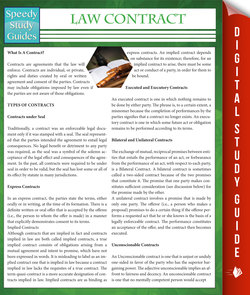Читать книгу Law Contracts (Speedy Study Guides) - Speedy Publishing - Страница 2
На сайте Литреса книга снята с продажи.
ОглавлениеLAW CONTRACT
What Is A Contract?
Contracts are agreements that the law will enforce. Contracts are individual, or private, rights and duties created by oral or written agreement and consent of the parties. Contracts may include obligations imposed by law even if the parties are not aware of those obligations.
TYPES OF CONTRACTS
Contracts under Seal
Traditionally, a contract was an enforceable legal document only if it was stamped with a seal. The seal represented that the parties intended the agreement to entail legal consequences. No legal benefit or detriment to any party was required, as the seal was a symbol of the solemn acceptance of the legal effect and consequences of the agreement. In the past, all contracts were required to be under seal in order to be valid, but the seal has lost some or all of its effect by statute in many jurisdictions.
Express Contracts
In an express contract, the parties state the terms, either orally or in writing, at the time of its formation. There is a definite written or oral offer that is accepted by the offeree (i.e., the person to whom the offer is made) in a manner that explicitly demonstrates consent to its terms.
Implied Contracts
Although contracts that are implied in fact and contracts implied in law are both called implied contracts, a true implied contract consists of obligations arising from a mutual agreement and intent to promise, which have not been expressed in words. It is misleading to label as an implied contract one that is implied in law because a contract implied in law lacks the requisites of a true contract. The term quasi-contract is a more accurate designation of contracts implied in law. Implied contracts are as binding as
express contracts. An implied contract depends on substance for its existence; therefore, for an implied contract to arise, there must be some act or conduct of a party, in order for them to be bound.
Executed and Executory Contracts
An executed contract is one in which nothing remains to be done by either party. The phrase is, to a certain extent, a misnomer because the completion of performances by the parties signifies that a contract no longer exists. An executory contract is one in which some future act or obligation remains to be performed according to its terms.
Bilateral and Unilateral Contracts
The exchange of mutual, reciprocal promises between entities that entails the performance of an act, or forbearance from the performance of an act, with respect to each party, is a Bilateral Contract. A bilateral contract is sometimes called a two-sided contract because of the two promises that constitute it. The promise that one party makes constitutes sufficient consideration (see discussion below) for the promise made by the other.
A unilateral contract involves a promise that is made by only one party. The offeror (i.e., a person who makes a proposal) promises to do a certain thing if the offeree performs a requested act that he or she knows is the basis of a legally enforceable contract. The performance constitutes an acceptance of the offer, and the contract then becomes executed.
Unconscionable Contracts
An Unconscionable contract is one that is unjust or unduly one-sided in favor of the party who has the superior bargaining power. The adjective unconscionable implies an affront to fairness and decency. An unconscionable contract is one that no mentally competent person would accept
